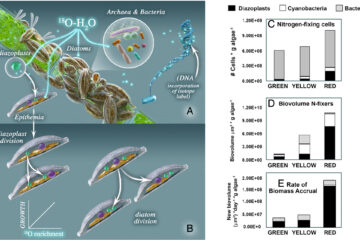Leaf-litter leachate is distinct in optical properties and bioavailability to stream heterotrophs
Dissolved organic C (DOC) leached from leaf litter contributes to the C pool of stream ecosystems and affects C cycling in streams. We studied how differences in leaf-litter chemistry affect the optical properties and decomposition of DOC. We used 2 species of cottonwoods (Populus) and their naturally occurring hybrids that differ in leaf-litter phytochemistry and decomposition rate. We measured DOC and nutrient concentration in leaf leachates and determined the effect of DOC quality on heterotrophic respiration in 24-h incubations with stream sediments. Differences in DOC composition and quality were characterized with fluorescence spectroscopy. Rapidly decomposing leaves with lower tannin and lignin concentrations leached ∼40 to 50% more DOC and total dissolved N than did slowly decomposing leaves. Rates of heterotrophic respiration were 25 to 50% higher on leachate from rapidly decomposing leaf types. Rates of heterotrophic respiration were related to metrics of aromaticity. Specifically, rates of respiration were correlated negatively with the Fluorescence Index and positively with Specific Ultraviolet Absorbance (SUVA254) and T280 tryptophan-like fluorescence peak. These results reveal that leaf-litter DOC is distinctly different from ambient streamwater DOC. The relationships between optical characteristics of leaf leachate and bioavailability are opposite those found in streamwater DOC. Differences in phytochemistry among leaf types can influence stream ecosystems with respect to DOC quantity, composition, and rates of stream respiration. These patterns suggest that the relationship between the chemical structure of DOC and its biogeochemistry is more complex than previously recognized. These unique properties of leaflitter DOC will be important when assessing the effects of terrestrial C on aquatic ecosystems, especially during leaf fall.


